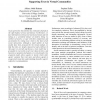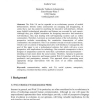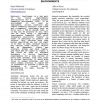74 search results - page 5 / 15 » Social Interaction on the Net: Virtual Community as Particip... |
ICEIS
2009
IEEE
14 years 2 months ago
2009
IEEE
With the multiplication of communication medium, the increasing multi-partner global organizations, the remote working tendencies, dynamic teams, pervasive or ubiquitous computing ...
HICSS
2000
IEEE
13 years 11 months ago
2000
IEEE
At any given time, the stability of a community depends on the right balance of trust and distrust. Furthermore, we face information overload, increased uncertainty and risk takin...
CSCW
2008
ACM
13 years 9 months ago
2008
ACM
This paper describes the design and evaluation of Shared Speech Interface (SSI), an application for an interactive multitouch tabletop display designed to facilitate medical conve...
IICS
2009
Springer
14 years 1 months ago
2009
Springer
: The Web 2.0 can be regarded as an evolutionary process of medial differentiation. Infinite online communities are emerging and disappearing. It seems that a race has started in s...
HICSS
2002
IEEE
14 years 9 days ago
2002
IEEE
Legitimacy is a key part of the social requirements specification for a trusted virtual community environment (VCE). If an environment is not seen as legitimate, social conflicts m...




